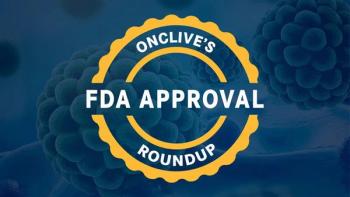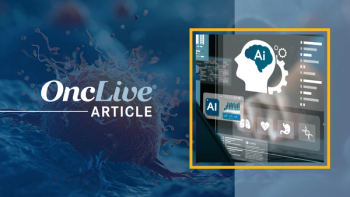
Evidence-Based Extrapolation for Biosimilars
Transcript:
Lee Schwartzberg, MD, FACP: The factors that allow me to be comfortable choosing a biosimilar over an originator biologic are based, number 1, on the regulatory process, which I have faith in, that the FDA worked out. Number 2, it depends on the clinical trial data, and one can look at different settings of clinical trial data. But an important concept that we haven’t talked about for biosimilars is extrapolation. That has both a regulatory and an operational definition. The regulatory definition from the FDA is that you do 1 clinical trial in a sensitive population, so you can pick up any difference whatsoever between the originator and the biosimilar. And if you get a result that shows equivalence, then you can extrapolate that into other settings in the same disease. But also, you can extrapolate that into any other approved indication for a particular drug.
In the case of trastuzumab, it also has approval in gastric cancer and GE [gastroesophageal] junction cancers that are HER2 [human epidermal growth factor receptor 2]-positive. And per that concept of extrapolation, the label for the trastuzumab biosimilars allow it to be used in that setting, even though it, to my knowledge, has not been tested extensively in gastric cancer. Most of the studies have been in HER2-positive metastatic or early stage breast cancer because that’s the overwhelming group that has this HER2 alteration.
That extrapolation concept is important also within breast cancer. If you’re using a biosimilar, as we are, that was tested in the neoadjuvant and adjuvant setting, it can also be used in the metastatic setting. So, if we have a patient with metastatic HER2-positive breast cancer for whom trastuzumab is indicated, which is virtually all of them, I feel comfortable also extrapolating and using it in that setting as well.
I believe that any biosimilar can be extrapolated to any other indication that’s in the FDA label. Because there are a lack of data in areas where there’s not an approval and where there weren’t previous studies, I would be hesitant to take a biosimilar, just like I would be with the originator, and use it in a non-indication situation, or at least where there have not been studies to date.
I think biosimilars are a very valuable asset, but their main value is the fact that they cost less than the originator product. And the real reason to develop biosimilars is that the regulatory pathway, as I described, is less complex; or I should say not necessarily less complex, but less heavily weighted toward the clinical development, which is the most expensive part. So still very complex and very rigorous, but it’s more about showing that the molecule is like the originator molecule, rather than doing a testing in every patient population. And so, this concept of extrapolation helps because you don’t have to spend tens of millions, or hundreds of millions of dollars to test it in every population in a large group of patients.
So, the main value of biosimilars is reducing cost to the patient, and reducing cost to the system, because these drugs are typically priced at a substantial discount to the originator drug. Mainly because, again, the cost of innovation and the cost of development was less here to get a molecule that works the same way.
And in our United States healthcare system, we need cost reduction maneuvers because the cost of cancer care, the cost of healthcare in general, is out of sight and out of control. So anything we can do to reduce the cost without reducing the value or the effectiveness of a drug is a real benefit for everyone in the system. I see it as a win-win. It’s good for the patient, it’s good for the payer, it’s good for the provider, and it’s good for the companies that come up with the biosimilars when patents expire on the originator products. And that’s why there are so many getting in.
I will say that one of the things that makes me think about the best biosimilar to use when there are a variety of options on the market, is the company that’s manufacturing it. I mentioned that these are very complex molecules to manufacture. You can’t just set up a plant and do this. This is in living cells. All of the conditions have to be very tightly controlled and quality assured on an ongoing basis. Plus, because they’re so complex they actually can vary over time by a factory that’s doing it maybe a little differently than another. Over time it changes. So it requires a lot of attention. Therefore, you should always think about the company that’s making it, their experience in making biologicals in the past, and the supply.
One of the things we’ve seen over the last few years that is shocking for someone who has been practicing for a long time is sometimes gaps in the supply of lifesaving drugs, even very old drugs, and especially generics, which is a different issue. But the last thing you want is to be prescribing a drug to a patient that’s working and then find out, and call the manufacturer for another supply and they say, “The factory went down and we’re not going to have it next month.” That’s a terrible thing for a patient. So reliability, experience in manufacturing biologicals, and making sure the supply chain is good, as well as the price, which is very important, are all factors to consider when choosing a biosimilar.
My clinical experience with biosimilars is very favorable. As I mentioned, we got comfortable with the growth factors and could see the effects of those very easily. I’m confident in the companies that are bringing biosimilars to market. We make sure that they are reputable companies with lots of experience and that we’re not going to have any disruption in the supply chain. We make sure that the pricing is fair, and that there’s value to every member, every constituency in the value chain there. And our patients have been very comfortable accepting biosimilars.
In my own practice what we’ve done is, once we make a decision to use a biosimilar, as biosimilar trastuzumab, every new patient who starts will be consented for the biosimilar. And like any drug we give, there’s a consent form that goes over the potential adverse effects so a patient is aware of them. Biologicals, and biologicals like trastuzumab which is an antibody, occasionally cause infusion reactions or other reactions. Like every other drug, and certainly every other biological there is a potential for toxicity and adverse effects, as well as the specific adverse effects of these drugs. So, we always go over that with the patient, and we would have a specific consent that related to the biosimilar trastuzumab we’re using.
It’s a little more complicated for patients who have already been on the originator molecule. What we have decided in our practice, and this is by no means uniformly accepted, there have been a variety of different approaches. In my own practice what we do is we have asked the provider to talk to the patient and say, “We have another version of the drug you’re getting. It works just as good as the other one. It’s a biosimilar, and it’s highly similar in terms of its efficacy and its safety, but it will cost you less, it will cost us less, and we’d like to change you to that. Are you comfortable with that?” And almost invariably we get, “yes,” and then they know that they’re on a new drug. So that protects everybody.
Transcript Edited for Clarity




































